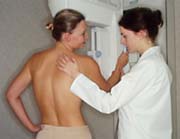This subject area encompasses research and studies in the field of human medicine.
Among the wide-ranging list of topics covered here are anesthesiology, anatomy, surgery, human genetics, hygiene and environmental medicine, internal medicine, neurology, pharmacology, physiology, urology and dental medicine.

Patients who have been newly diagnosed with breast cancer now have access to the experiences of other people living with the disease via the multi-media website DIPEx (Database of Individual Patient Experiences), a resource of patient interviews in written form, audio and video clips. From today [13 Feburary 2002] the DIPEx website includes a new module on breast cancer, in addition to hypertension and prostate cancer.
The aim of the new module is to prepare those diagnosed with breast cancer fo

Large scale study spells out links with pregnancy and miscarriage.
Childless women are at a higher risk of developing breast cancer, confirms one of the largest studies on reproductive factors and the disease, but those who suffer miscarriages are not. Researchers are pinning down key risk factors in the hope of working out exactly how they increase susceptibility.
How pregnancy and abortion alter women’s chance of developing breast cancer has been the subject of conflictin

The more affluent the area in which she lives, the more dissatisfied a woman is likely to be with her body image, indicates research in the Journal of Epidemiology and Community Health.
The researchers carried out a random telephone survey of 895 women aged 25 to 56. The women lived in 52 neighbourhoods in the provinces of Alberta, Ontario, and Quebec in Canada. The survey was designed to cover differing social and income brackets. National census data were then used to track the overall af

Injectable “suicide gene” therapy may be a highly effective way of preventing colon cancer from spreading (metastasising), finds research in Gut. Human colon cancer carries a high risk of death because it is often not found in the early stages and readily spreads to the liver, but also the lungs and throughout the abdominal cavity (peritoneum).
And the suicide gene treatment seems to be just as effective when injected beneath the skin as it is when introduced directly into the tumour site, t

The next generation of biomaterials will help the body heal itself by prompting cells to repair their own tissues, scientists report today.
Writing in a review in the journal Science, Professors Larry Hench and Julia Polak of Imperial College, London, highlight the potential of `third generation` biomaterials that activate specific cells and genes of the individual they are implanted into.
Pioneering work by the two authors recently led to the discovery of a family of bone f

Glue ear — a frequent cause of deafness in children — could be a result of gastric reflux, which results in stomach proteins accumulating in the middle ear via the Eustachian tube, suggest authors of a research letter in this week’s issue of THE LANCET.
Glue ear is common among children after middle-ear infections (otitis media); effusion, produced by mucus cells, occurs in the middle ear and cannot be cleared. It is a particular problem for young children because of the angle and imm